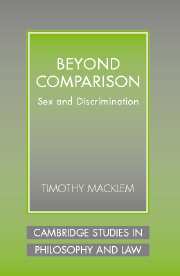1 - The Issues
Published online by Cambridge University Press: 05 June 2012
Summary
Discrimination and Equality
It is a hot summer's day, ice-cream weather, sunbathing-in-the-park weather. A woman walks down the street, bare-breasted. Asked to cover herself, she refuses. As she sees it, indeed as she explains it to the police officer, if a man is entitled to appear in public naked to the waist, as he certainly is, she is entitled to do the same. It would be discriminatory, she insists, for the law to deny this and so treat her behaviour as indecent. Is she right? Does a woman's nakedness mean the same thing as a man's? If not, should it? What is gained by understanding discrimination in this way? What is lost?
The complexity and significance of the problem become clearer when it is looked at from the opposite perspective. Suppose it is true that a woman, like a man, is entitled to appear in public naked to the waist, in hot weather at least (as in fact the courts decided). What makes this so? The answer has large implications for our understanding of both sexual difference and the nature of value. Whatever may have been claimed by the topless pedestrian in question, it cannot be the case that there are meaningful differences between the sexes, yet that women are entitled to do whatever men are entitled to do (and vice versa), without regard to those differences.
- Type
- Chapter
- Information
- Beyond ComparisonSex and Discrimination, pp. 1 - 41Publisher: Cambridge University PressPrint publication year: 2003



